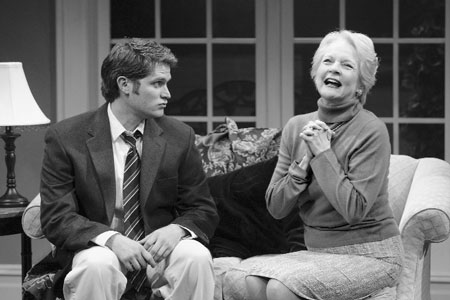By Davida Singer
In his twenty-three years of writing plays like “Pterodactyls,” “Raised in Captivity,” “Eros Trilogy” and “The Altruists”, Nicky Silver has won or been nominated for many awards – from Drama Desk to the Oppenheimer.
“Although the Oppenheimer is a very prestigious one, it’s so ugly I keep it in a closet,” he quips.
Known for his arch wit, Silver also walks the dark side, and his new drama, “Beautiful Child,” starring George Grizzard and Penny Fuller, involves a troubled teacher returning home to a family who struggle to accept and love him again.
The playwright, a self-described “terrible shut-in” on the Upper Westside, won’t say more about the plot, but he’s got lots of other up-close-and-personal material to share.
Davida Singer: How did you get into playwriting?
Nancy Silver: I actually didn’t think I’d be a writer, I thought I would pop out of cakes. No, I thought of acting until I really started writing in college, at NYU. The Experimental Wing gave me a whole collection of things to work with. My writing style differs from play to play, but I tend to work in two veins. Farces alternating with plays that embrace serious subjects. This one is relatively dark, but not compared to a coalmine. It’s also very funny.
DS: Would you call your plays gay?
NS: I’m not usually described as a gay playwright, but gay people are a part of my landscape. When I started, I decided I didn’t want to be marketed that way, and in 2004 I think we don’t need that distinction. It’s just not all that interesting to me now. In this work, sexual orientation is a given among the characters.
DS: It’s almost a given that your plays will go up at the Vineyard.
NS: It’s been a long relationship – since 1983 – much to their chagrin. After college, I did plays at the Meisner Theater for a while. Then I sent out “Pterodactyls” to the Vineyard, and they weren’t afraid of doing it. I think of the Vineyard as my home. I sent this play to Doug Abel as a friend, and he wanted to do it. The kind of plays I write are frightening to put up because they’re so personal, but I’m very comfortable there. There’s even a place I can smoke and no one knows.
For “Beautiful Child”, I wanted to work with a new director, and Doug gave me a list. I don’t know a lot of names, but I liked Terry Kinney’s work and ten minutes into a meeting with him I wanted him to do it. We see the play similarly, but we’re very different people, so he brings a whole other perspective.
DS: What’s the concept behind “Beautiful Child”?
NS: It really explores a question I’ve done before. How do people love someone who functions outside of their moral sphere. I don’t write plays that have answers, so I never know, but sometimes I find one. Here? I think I found a possible answer. It suggests the ruthlessness of our need to connect to people.
DS: What’s behind your need to write plays?
NS: I go into it because I like putting plays on. I like going to rehearsal, I like the process and community. But the degree to which I pipe up varies. Sometimes I actually stay away. And I was more daunted than usual by this cast. It was my first time working with all of them – scary, but a lot of fun – though none of the actors would sleep with me.
DS: Can you drop a final hint about what we’ll see and what you’d like us to see in “Beautiful Child”?
NS: The set itself is a living room and it does some tricks. At certain points, there’s furniture that floats in black, hopefully. But it is the Vineyard after all, not the Minskoff! I’d like people even for a second to question their preconceived notions of right and wrong, and how they deal with them in this country. And then I’d like them to feel an all-consuming awe of me.






































